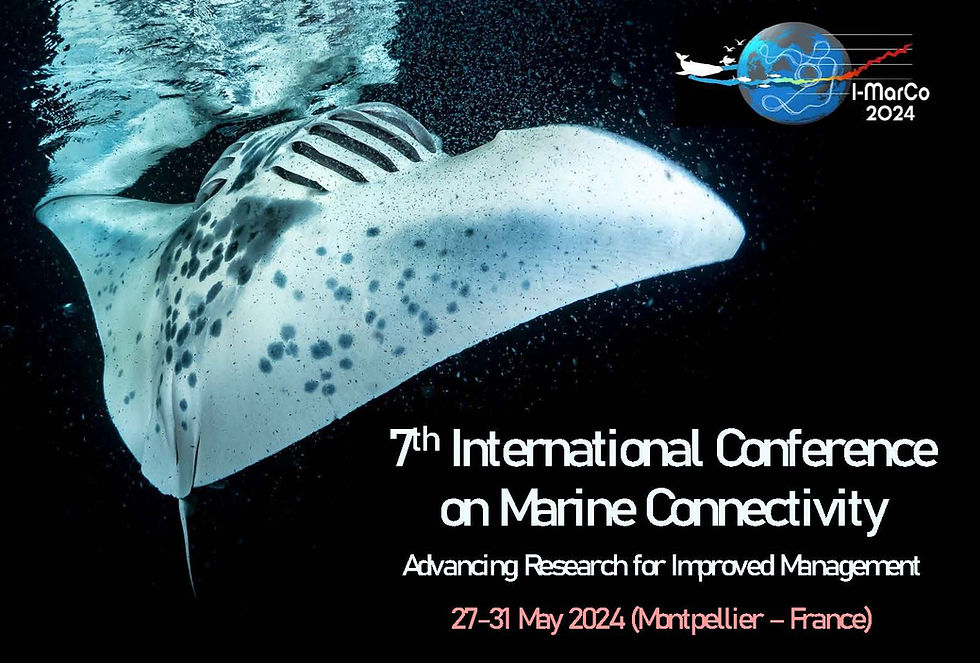Co-designing the Marine Connectivity Science we need for the Ocean we want
- Sea-Unicorn

- Jun 3, 2024
- 4 min read
Updated: Jan 2
On 31 May 2024, to complete the 7th International Marine Connectivity conference (I-MarCo 2024), SEA-UNICORN working groups 3-4 organized a full-day international workshop designed to bring together key stakeholders from government, business, and civil society organizations to engage with the world’s top marine connectivity scientists, to advance marine connectivity knowledge and its application in sustainable ocean management. Under the direction of Dr. Audrey Darnaude (SEA-UNICORN chair) and Pr. Frank Muller-Karger (head of the UN Ocean Decade Program Marine Life 2030), the workshop was animated by >20 active members of SEA-UNICORN.
This full-day event, organized in Montpellier with the financial and logistical support of the Fondation de l'Eau Groupama Mediterranée, gathered 51 marine connectivity experts with varied backgrounds (e.g, genetics, animal behavior, biogeography, biophysical modelling, fishery science, marine spatial planning, social science, policy science) and 26 stakeholders from different sectors (e.g. MPA managers, policymakers, fisheries managers, marine professionals, NGOs), from 22 countries.
It featured a diverse agenda of keynote talks, roundtable discussions and interactive breakout sessions with leading experts and stakeholders, aimed at identifying the most pressing societal needs for marine connectivity data and the main barriers to integrating this knowledge into environmental policy and decision-making at all levels.
Introductory keynotes
The workshop kicked off with a series of brief but insightful presentations on Marine Functional Connectivity (MFC) and its value for environmental governance and management. Dr. Audrey Darnaude (France) introduced the concept and challenges of Marine Functional Connectivity (MFC) science, using an engaging cartoon video to illustrate key points.

This was followed by a thought-provoking presentation on transboundary marine policy issues by Dr. Yael Teff-Seker (USA) and Peter Mackelworth (Croatia), before Pr. Maria Beger (UK) highlighted the primary importance of taking into account MFC for effective marine spatial planning.
High-Level Plenary Round Table
Moderated by Dr. Ewan Hunter (UK) and Audrey Darnaude (France), the following plenary round table featured 5 experts in global international governance and management tools and frameworks : Pr. Anna Metaxas (Canada), Pr. Frank Muller Karger (USA), Dr. Eirini Glyki (Denmark), Dr. Francis Marsac (France), and Dr. Youna Lyons (Singapore). The panelists reviewed the current state of consideration of MFC at the global transboundary scale for biodiversity conservation, fisheries management, and high seas and deep-sea legislation. Their interactive discussion included a lively Q&A session with the audience, fostering a dynamic exchange of ideas and information.

Short Talks & Panel Discussion
After the morning coffee break, attendees reconvened for a series of short presentations and a panel discussion moderated by Dr. Peter Mackelworth (Croatia) and Pr. Filip Volkaert (Belgium). The session featured compelling testimonies from key stakeholders on the value of MFC in addressing various issues:
Sylvain Blouet (MPA Manager, France) and Laura Bastide and Clara Jarry (Acteon Environment company, France) discussed practical MFC use for the positioning of Marine Protected Areas (MPAs), sharing insights from current efforts on establishing a coherent network of French MPAs.
Risper Oteke (She-Nature, Tanzania) played on a powerful video she had made on mangrove restoration efforts in Kenya and their impact local artisanal fisheries, and discussed the importance of considering ecological and social connectivity at different levels of policy and management.
Gilles Lecaillon (ECOCEAN company, France), Sylvain Blouet (MPA Manager, France), and Stéphanie Mahevas (MARBEC, France) highlighted several innovative ecological restoration projects in the MPA of Agde, including the use of bio-huts to restore fish nursery functions in marinas and harbors, before discussing the importance of considering MFC for the success of such initiatives.
The morning session concluded with a brief review of the afternoon's breakout sessions, emphasizing the importance of continued collaboration at the interface between science, policy and society.
Afternoon Breakout Sessions

After the lunch break, participants gathered at the GROUPAMA facilities for the afternoon's interactive breakout sessions. They were first assigned to 6 small groups, each of which aimed to advance MFC science & decision tools for a specific area of marine management or governance:
MPA design & management
Fisheries management
Sustainable blue economy
Integrated environmental management at the land-sea interfaces
Seascape restoration
Remote areas’ conservation & management (including deep and high seas)
To this end, each breakout group brought together a mix of 10-15 scientists and stakeholders, selected on the basis of their respective expertise to optimize the identification of ideal uses of MFC knowledge for the topic under consideration, before identifying barriers to data integration in decision-making processes and proposing practical solutions to overcome them. This exercise, which involved in-depth transdisciplinary discussions and collaborative problem-solving, resulted in a better overview of how best to integrate marine connectivity science into each topic.
Plenary Presentations & Closure
After a short coffee break, participants gathered in the main GROUPAMA hall for a plenary presentation of each group's conclusions. Closing remarks focused on the day's achievements and highlighted the way forward for further collaboration and innovation in integrating marine connectivity into ocean management.

The workshop successfully fostered a collaborative environment, bringing together diverse voices to co-design solutions for more sustainable ocean management. As participants parted, there was a palpable sense of common purpose and commitment to advancing knowledge of marine connectivity and its use. This should be reflected in the coming months through the co-authoring of a white paper to be proposed for presentation at the One Ocean 2025 summit in Nice.
For more information, visit: https://www.sea-unicorn.com/i-marco-2024/workshop-and-round-tables



















Comments